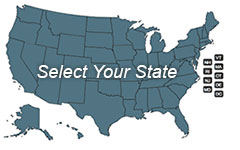Mental Health Counseling Licensure in Florida

Florida recognizes mental health counseling as a unique discipline and licenses professionals accordingly. The Licensed Mental Health Counselor credential is granted on the basis of education and examination that is specific to the mental health counseling discipline. Supervised practice is also required. This is earned while registered as a Registered Mental Health Counselor Intern.
- Featured Online CACREP Accredited Master's in Counseling Program Options:
- Liberty University, a non-profit university, offers a CACREP accredited online Master of Arts in Clinical Mental Health Counseling. Click here to learn more about Liberty University and their Master of Arts in Clinical Mental Health Counseling.
- Prepare for counseling licensure in as few as 27 months with Pepperdine’s online MA in Clinical Psychology - no GRE required. The program is top ranked for return on investment (ROI) by OnlineU.
- Southern New Hampshire University (SNHU) offers a CACREP accredited online BA in Psychology - Mental Health. Click here to learn about the counseling programs at SNHU.
- Grand Canyon University offers an M.S. in Clinical Mental Health Counseling with an Emphasis in Childhood and Adolescence Disorders; Christian Counseling; Marriage & Family Therapy and Trauma.
- Sacred Heart University's Master of Arts in Clinical Mental Health Counseling is offered online and was developed based off CACREP standards to prepare graduates for licensure in most states. Click here to learn more about Sacred Heart University and the online Master of Arts in Clinical Mental Health Counseling.
Select a Florida Mental Health Counselor Licensure Topic:
- LMHC Education Requirements
- The Intern Application Process
- Required Examination
- Supervision Requirements
- Additional Required Training
- Out-of-State Counselors
- Application Process
- Contacts and Additional Information
Educational Requirements
Mental health counselors must have education at the master’s level. There are two educational pathways. Students who have completed mental health counseling programs that are accredited by the Council for Accreditation of Counseling and Related Educational Programs (CACREP) are presumed to meet all Florida coursework requirements with the possible exception of 1) substance abuse and 2) human sexuality; coursework in these two areas must be documented. The Board notes that graduates of other CACREP-accredited programs such as community counseling or counselor education are not assumed to have met coursework requirements.
Students can also be licensed on the basis of other graduate programs in fields related to mental health counseling, so long as the programs are housed in regionally accredited institutions. A prospective mental health counselor will need to document 60 semester hours of graduate credit, with three semester hours in each of the following:
- Human growth and development
- Psychopathology
- Theories and practice of counseling
- Individual assessment and evaluation
- Group theories
- Human sexuality
- Substance abuse
- Career and lifestyle development
- Counseling in community settings
- Social and cultural foundations
- Research and program evaluation
- Legal and professional standards
A graduate may be licensed at the intern level on the basis of having had coursework in seven of the required areas (http://floridasmentalhealthprofessions.gov/licensing/registered-mental-health-counselor-intern/). It is mandatory that psychopathology be among the seven areas covered.
The counseling program is to include a practicum that meets CACREP standards or that is university-sponsored and comprised of 1,000 hours. However, graduates who fall short of meeting the practicum requirement may make up deficiencies while credentialed at the intern level.
The Intern Application Process
A candidate applies first at the intern level. The applicant will need to provide official transcripts as well a letter documenting that practicum requirements have been met. Graduates of non-CACREP programs will need to include syllabi or course descriptions for required courses if the transcript does not clearly show that the required content was covered. Graduates of CACREP-accredited programs may need to provide course descriptions for substance abuse and human sexuality coursework.
The intern will need to have identified a supervisor by this stage. The supervisor will also provide documentation to the Board.
Supervised Practice Requirement
The intern will need to work under a qualified supervisor for at least two years (100 weeks). At least 1,500 hours of psychotherapy must be performed during the supervision period. The intern will need at least an hour of supervision for every 15 hours of psychotherapy, with a minimum of one hour every two weeks. The Florida Board will allow some supervision to take place in a group setting with two to six interns in addition. However, group supervision hours must be alternated with individual supervision hours (http://floridasmentalhealthprofessions.gov/licensing/licensed-mental-health-counselor).
Examination Requirement
A candidate must also pass the National Clinical Mental Health Counseling Examination (NCMHCE) before full licensure can be granted. The examination is now under the administration of the National Board for Certified Counselors (NBCC).
In order to be authorized by the Florida Board, an individual must have completed coursework in all 12 required areas. An approved candidate will submit registration materials to the NBCC along with a $195 fee. Approximately four weeks later, the candidate will be authorized to schedule an examination. The candidate will then visit AMP on the web (www.goAMP.com) or call 888-519-9901.
The exam is administered on a monthly basis at AMP sites in ten Florida cities and in many other locations around the nation. All sites offer weekday exams during the two-week testing window; some also have Saturday hours.
The NBCC maintains a page with Florida-specific testing information (http://www.nbcc.org/directory/FL). The page also includes a link to the NCMHCE candidate handbook.
Additional Required Training
Additional training hours may be taken as continuing education. The prospective mental health counselor must complete eight hours of training in laws and rules and two hours in medical error prevention. Both courses will need to be taken through approved providers. Certificates must be submitted to the Board with the license application.
The candidate will need three hours in HIV and two hours in domestic violence, if not before licensure, within six months after. The counselor will retain records of these two trainings.
The Mental Health Counselor Application Process
The candidate may download an application or apply online. Links to both options are found on the “licensing” page (http://floridasmentalhealthprofessions.gov/licensing/). The same application packet is used for multiple mental health professions. An applicant at the counselor level pays a $100 application fee and $105 license fee.
Out-of-State Counselors
Out-of state counselors must provide license verification from all states where they have ever held licensing. An out-of-state counselor who has practiced for at least three out of the five years preceding application and who holds an active license may be licensed by endorsement. The Board will require transcripts, but will not require documentation of supervised practice.
An out-of-state counselor who has been licensed less than three years will use the “apply by examination” method, but will not be required to take the NCMHCE examination again if it has already been passed. In many cases, examination results can be documented through the license verification form. The out-of-state candidate applying by examination will document both supervised experience and supervisor credentials (licensure or education).
Out-of-state counselors who have completed their two years of supervised practice but do not yet meet all Florida requirements may request provisional licensure (http://floridasmentalhealthprofessions.gov/licensing/licensed-mental-health-counselor/). This is a nonrenewable license, valid for 24 months. Supervision is required at the minimum rate of one hour per month. A candidate who needs a provisional license pays an additional $100.
The Board notes that in all cases, examination is required prior to full licensure.
Candidates who were educated in other nations will need to have their credentials professionally evaluated. This does not apply to Canadian graduates.
Additional Information
The Florida Board of Clinical Social Work, Marriage & Family Therapy, and Mental Health Counseling (http://floridasmentalhealthprofessions.gov) manages a Customer Contact Center between 8:00 AM and 6:00 PM Eastern Time; the center can be reached at (850) 488-0595. General questions may be sent by email contact form (http://floridasmentalhealthprofessions.gov/help-center/#contact).
The Florida Mental Health Counselors Association is the state professional organization (https://fmhca.wildapricot.org/).
Find Mental Health Counselor Licensure Requirements in Your State:

Learn about becoming a Mental Health Counselor in your state:
To View Full U.S. Map Click Here.